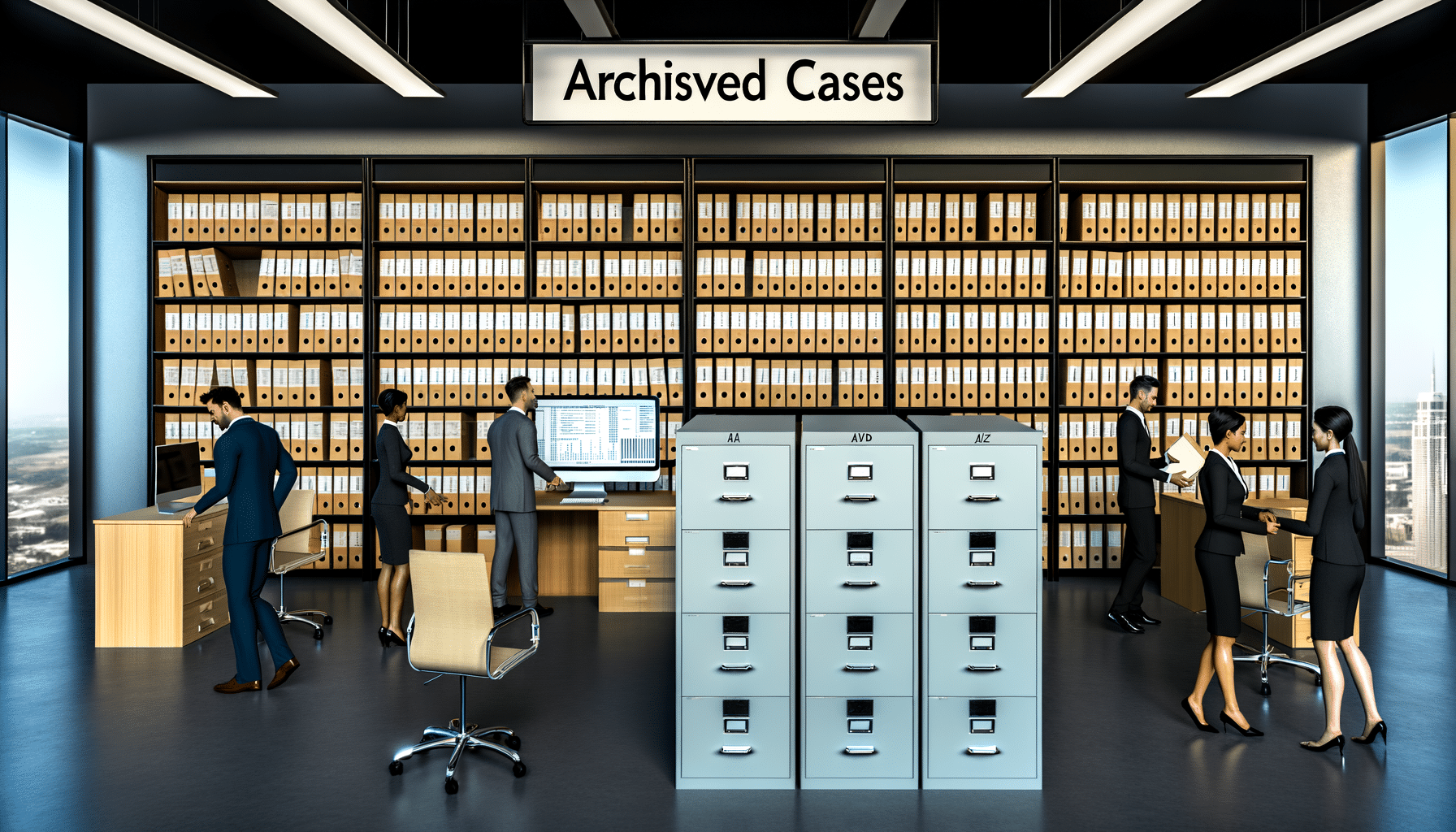- Case Closure Strategies
- August 29, 2024
Best Practices for Archiving Closed Legal Cases

Reflecting on years of grappling with mountains of paper and endless digital files in the legal domain, I’m often reminded of the immense challenges legal offices face when handling records of closed cases. It’s a unique crossroads of compliance, storage strain, and accessibility. Embracing modern solutions like RecordsKeeper.AI has illuminated a path through this labyrinth, offering transformative ways to archive these intricate documents effectively.
The Importance of Archiving Closed Legal Cases
For legal professionals, the archival process is far from just a matter of tidiness. It’s about securing sensitive information, maintaining compliance with legal statutes, and ensuring easy retrieval when needed. The challenge lies in doing all of this without consuming excessive time or resources. A poorly managed archive can spell disaster, with potential legal ramifications for mishandled data or missed retrieval requests.
Simplifying Organization and Retrieval
Let’s talk organization—a cornerstone of successful legal archiving. With traditional methods, one might spend exorbitant hours simply categorizing and later trying to retrieve the right document. Herein lies the beauty of AI-driven solutions. AI not only categorizes files based on content but also recognizes complex legal terminologies and tagging requirements, which makes retrieval as intuitive as asking a question. Our RecordsKeeper.AI platform excels in this, reducing endless scrolling through files to mere seconds of search.
Ensuring Secure Storage
Security is paramount when archiving closed cases. Here, blockchain technology comes into play, providing immutable and tamper-proof storage that remains robust against unauthorized access. In my experience, a blockchain-backed platform like RecordsKeeper.AI offers unparalleled data integrity, ensuring that the information stored maintains its original state through generations of digital evolutions.
Compliance Made Effortless
The legal landscape constantly shifts with evolving regulatory requirements. Automated compliance management systems are crucial in this scenario. With platforms that support various regulatory frameworks like GDPR, HIPAA, and SOX, compliance becomes an integral part of the archiving process rather than an afterthought. RecordsKeeper.AI, for example, continuously adapts to new compliance mandates, providing peace of mind that stored records meet legal obligations without human oversight.
Optimizing Storage and Cost Efficiency
A legal archive is only as good as its capacity for cost-effective storage. Technological solutions facilitate the adoption of cloud storage, offering dynamic scalability. By automating data retention policies, these platforms help avoid unnecessary storage of outdated files, which can quickly add up to significant cost savings. Automated data lifecycle management ensures optimal use of storage space, reducing both the physical footprint and associated expenses.
Facilitating Disaster Recovery
Unexpected events can pose risks to physical and digital records alike. A robust archiving strategy incorporates automated backup and disaster recovery solutions. Ensuring regular system backups and offering quick recovery options, RecordsKeeper.AI averts data loss, providing a resilient safety net that ensures business continuity under any circumstance.
Steps for Implementing Effective Archiving Practices
Implementing these solutions requires strategic planning. Here’s a simplified guide to get started:
- Evaluate existing archiving systems and identify gaps
- Select a comprehensive archiving solution like RecordsKeeper.AI
- Train staff on new systems and compliance standards
- Continuously review and update the archive system as required
Adapting to modern archiving practices not only streamlines operations but also enhances a firm’s ability to thrive in an increasingly digital world.
Conclusion
Efficiently archiving closed legal cases bridges the gap between past and future functionalities, ensuring that information is handled with the care it deserves. By leveraging platforms like RecordsKeeper.AI, we transform archiving from a mundane task to a strategic asset. This is not just about document storage—it’s about fortifying the foundation on which legal excellence rests. I invite you to join me on this journey of innovation in record management. For more insights, please stay tuned as I unravel further nuances on navigating the kaleidoscope of legal tech.
Toshendra Sharma is the visionary founder and CEO of RecordsKeeper.AI, spearheading the fusion of AI and blockchain to redefine enterprise record management. With a groundbreaking approach to solving complex business challenges, Toshendra combines deep expertise in blockchain and artificial intelligence with an acute understanding of enterprise compliance and security needs.
Archives
- January 2025
- December 2024
- November 2024
- October 2024
- September 2024
- August 2024
- July 2024
- June 2024
- May 2024
- April 2024
- March 2024
- February 2024
- January 2024
- December 2023
- November 2023
- October 2023
- September 2023
- August 2023
- July 2023
- June 2023
- May 2023
- April 2023
- March 2023
- February 2023
- January 2023
- December 2022
- November 2022
- October 2022
- September 2022
Want to get more content like this?
Signup to directly get this type of content to your inbox!!
Latest Post
Document Control for Equipment Maintenance
- January 20, 2025
Managing Records for Multiple Clients
- January 19, 2025
Handling Conference Documentation
- January 18, 2025
Setting Up Department Record Reviews
- January 17, 2025





